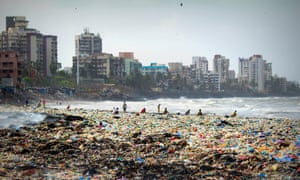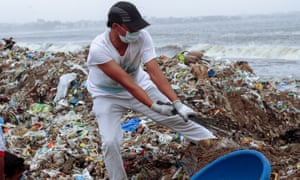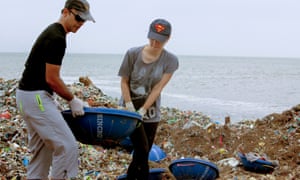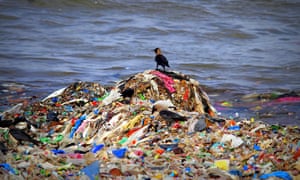Modern life doesn’t have to be rubbish: helping Mumbai clean up its act
On a suburban beach scores of volunteers take on mountains of waste and years of apathy in India’s most populous city

The litter-strewn Versova beach in Mumbai. Photograph: Neerav Ghosh
Bhavya Dore in Mumbai
A plastic bag peeked out from under the mud. Neerav Ghosh put on his synthetic gloves and got to work with his daughter, yanking it out along with the other detritus embedded in the beach.
It was 1.30pm on a Sunday, and as the rains lashed Versova beach in an upmarket suburb of Mumbai, they went about pulling, plucking and clearing rubbish. Standing on the edge of the water, Ghosh, 43, points to a spot 20 metres away from the shoreline and says: “For the first two weeks that we cleaned, we couldn’t even see the sand till there. The first time that we saw the first grain of sand was just overwhelming.”
Ghosh, a film-maker, and his daughter are among the foot soldiers of the Versova Resident Volunteers, an informal citizen group that has accumulated more than 200 members since it began. Their task: cleaning up a notoriously dirty beach.
 Facebook Twitter Pinterest
Facebook Twitter Pinterest Since the group started in October 2015, they have cleared up 1,740 tonnes of waste – mostly plastic – that gets washed up by the sea. “Every week has been impactful,” says Ghosh. “It’s quite something that a few people can make a big difference.”
“We have given up our sleep and our free time because nothing is more important than protecting our oceans and holding them in trust for future generations,” says Afroz Shah, a 33-year-old lawyer who kickstarted the campaign. “If we don’t do it now, it will never get done.”
The residents have been working on a 1.5-mile stretch of beach in a western suburb close to film studios and homes of some of the biggest Bollywood stars.
One man is tugging hard at a black school bag buried in the mud. “I have lived by the sea for 28 years but have never interacted with it as much as I have in the past 10 months,” says Naresh Suri, 66. “Earlier, I admit I didn’t bother about [the environment]. But now I am totally transformed.”

A fishing community abuts the beach, and its members often join the ranks of students, homemakers, film crews and those who live nearby. “It gets cleaned up, but see how the garbage keeps returning,” says Virendra Hegde, 42, a fisherman, as he points to a dark grey channel of water that joins the ocean.
But the group has made significant progress since 1 June, when they arrived at this patch of beach to be confronted by what seemed like towering rubbish all around. “That day my heart sank,” says Mona Keshwani, 46. “‘How can we do this?’ I thought.”
Since then mountains – of rubbish – have quite literally moved. The beach cleanup has drawn the attention of Lewis Pugh, the UN environment programme’s patron of the oceans. The pioneering long-distance swimmer will joined the refuse collection efforts when he visited Mumbai last weekend.
The city has several beaches in varying states of cleanliness and has often been accused of civic apathy. In 2014 Mumbai ranked 147th in a nationwide cleanliness survey. In October that year the prime minister, Narendra Modi, launched “swachh Bharat abhiyan” (Clean India Mission), a national drive to clean up the country. Mumbai is now ranked 10th, according to the latest survey.

Since February, the municipal authorities have been assisting the beach cleanup on weekends, and from June began sending machines. “It is a continuous process,” says PR Masurkar, assistant municipal commissioner.
Though city officials are consistently pilloried for Mumbai’s pothole-studded roads, poor rain preparedness and a mismanaged city, residents have sought to move beyond that blame game. “You can’t keep blaming the authorities,” says Keshwani. “If someone doesn’t clean up, will you simply leave it? It is every citizen’s duty.”

